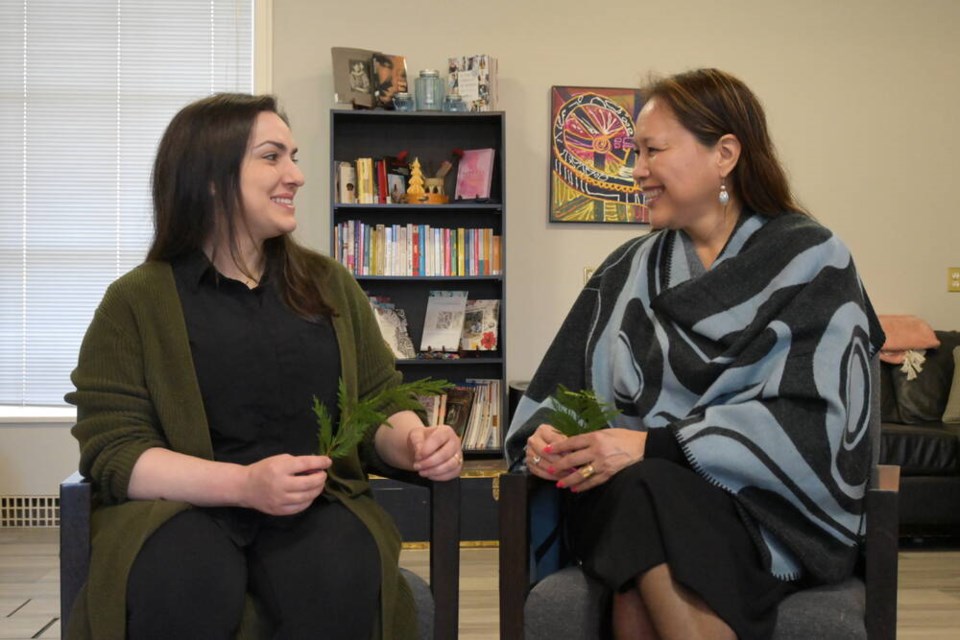Staff from a North Vancouver women’s centre are creating another safe space for those affected by intimate partner violence.
The North Shore Coordinating Committee to End Violence Against Women (VAWIR) is launching two, six-week healing circle groups – one for Indigenous female survivors of intimate partner violence and another for all self-identifying women.
“We see the need that survivors of gender-based violence need to have a safe place for them to be able to heal after what they experience,” said Golnaz Yazdi, safety and justice programs co-ordinator at the North Shore Women’s Centre.
VAWIR was established in 2001, supported and administered through the women’s centre. The committee recently received a $35,934 grant through the Ministry of Public Safety and Solicitor General to help fund the healing circles and other programs the women's centre offers, Yazdi said.
At the healing circles survivors will talk about a different topic each week, encouraged to share their experience with others alongside facilitators, including two Indigenous wellness consultants and a registered clinical counsellor. Participants in both circles will learn various healing techniques to help survivors express their emotions and thoughts. The Indigenous-led circle will also incorporate applicable traditions, values and beliefs to help people heal.
Palnata7 (Robbi Wilson), one of the Indigenous wellness consultants, described some of the healing medicines that will be provided for the group as survivors speak. Cedar branches will be used for brushing, which takes dense energy off the bodies and energy that may have been picked up from others, while healing items will be placed in the centre of the circle, she said.
The Indigenous healing circle will also talk about how many First Nations communities are matriarchal, meaning high respect for women, Wilson said, helping reclaim identity and move forward confidently.
“Returning to that core of who we are as Indigenous people, finding that strength, walking with that confidence and sense of self and sense of identity strongly again makes a big difference,” she said.
Nazanin Zarei is the registered clinical counsellor for the healing circles, specializing in trauma-informed therapy and art therapy. Zarei also speaks Farsi, which will help other survivors speak from different cultural backgrounds, Yazdi said.
Each year in B.C., 20,000 women experience relationship violence, according to the provincial government.
A 2022 survey of safety in public and private spaces found that Indigenous women are more likely than non-Indigenous women to experience intimate partner violence in their lifetime.
“We want to look into all aspects of a survivor’s life – from their mental, emotional, physical [and] social aspect of how life will be after,” Yazdi said. “So it is designated for survivors who have already left the abusive relationship.”
People can also bring their child to the circle, as there will be a separate space available for them to watch movies and have game nights. After the session is over, everyone will come together to enjoy pizza and drinks together.
“When someone leaves the abusive relationship, when kids leave the toxic environment of an abusive home, it’s not the end of this," she said. "It’s just the beginning of a new journey for them. Our hope is that this healing circle will play as an asset for them to start this new journey.”
The healing circle for all female survivors of intimate partner violence will take place every Friday evening from 6:30 p.m. to 8:30 p.m between Jan. 10 and Feb. 14 at the North Shore Women’s Centre. The Indigenous healing circle will take place every Tuesday evening at the same time between Jan. 14 and Feb. 18.
Those interested in attending the healing circles can email [email protected].
Abby Luciano is the Indigenous and civic affairs reporter for the North Shore News. This reporting beat is made possible by the Local Journalism Initiative.
[email protected]
https://x.com/abbyyluciano
https://bsky.app/profile/abbyluciano.bsky.social



